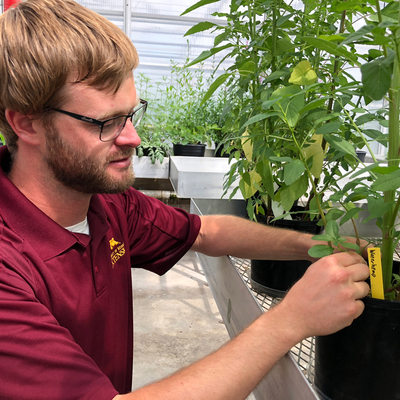In 2015, Minnesota lawmakers approved legislation that created the Agricultural Research, Education and Extension Tech Transfer program (AGREETT). Today, 21 AGREETT faculty and Extension educators at the University of Minnesota focus on clean water, crop and livestock productivity, microbial science, soil fertility, agricultural technology, pest resistance, climate change, and more.
With AGREETT funding, in 2017 Extension hired Jared Goplen, a University of Minnesota Extension crops educator based in Morris. A graduate student at the time, he would have been considered a great catch by any company. “They all wanted him,” says Jeff Gunsolus, the professor and Extension weed scientist Goplen studied under. Nicknamed “the weed watcher” in a Star-Tribune article, Goplen focused his thesis on how weed seeds with herbicide resistance behave in the soil.
What led you to your career?
I grew up on a farm near Canby in southwestern Minnesota just after the 1980s farm crisis, so there was a lot of encouragement to get an education and work off-farm. I started pursuing an engineering degree at a small college, but soon discovered it wasn’t for me. I changed my major to biology and earned my master’s and doctorate in agronomy from the University of Minnesota. Studying under Dr. Gunsolus meant conducting research in a farmer’s field in Olmsted County with Extension educators who live and work there. I got to understand and appreciate Extension’s practical value in Greater Minnesota.
What is the focus of your work?
Primarily wheat, oats and barley— but I am also working with lesser-known small grains. Many farmers in southern Minnesota are interested in small grains again, which are not as common in that part of the state as they once were. They want an alternate crop to break up pest cycles that trouble their corn and soybean crops. So they “rotate” in small grains, which means they might grow wheat along with corn and soybean. This rotation helps manage pests, meaning farmers can get some pest control without spraying. These rotations can also increase yields and decrease production costs. I also focus on forage plants for livestock grazing and cover crops.
How do you know your work matters?
Recently, a farmer mentioned he had to take a day off from his job in town to attend one of our workshops. Afterward, he told me he guarantees he will make more money from what he learned than what he would have at work that day. It is great to be able to help farmers be more productive and sustainable on their family farms so they can continue farming for the next generation. The personal connections made through workshops and field days are valuable for both the farmers I work with and for me. Learning what farmers struggle with also helps the University decide where to focus future research.


